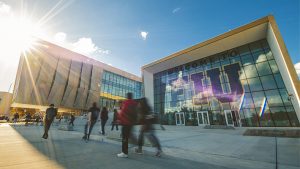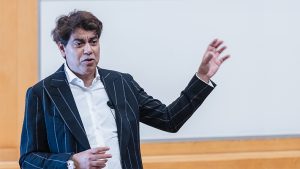A recent event brought together the Florida International University’s Pino Global Entrepreneurship Center, the Office of Intellectual Property Management and Resource Development, and the Applied Research Center (ARC); the president of South Florida Technology Alliance (SFTA); and 54 students in the College of Business Administration’s International MBA (IMBA) program taking Advanced Business Plan Development. The occasion: The students’ presentations of business plans for the commercialization of technologies developed by present and former university faculty members.
“It gave me the chance to see how these technologies could advance to the product stage.”
—Susan Webster (BA ’87), executive director, intellectual property management and resource development
“We asked IMBA students to take a fresh look at some technologies to give us ideas for possible commercial applications,” said Susan Webster (BA ’87), executive director, intellectual property management and resource development. “It gave them a chance to become acquainted with our office and what’s required to work with intellectual property in a business. It gave me the chance to see how these technologies could advance to the product stage.”
Students apply familiar business knowledge to unfamiliar turf: science and technology.
Luis Almodovar (IMBA ’07), training coordinator, human resources department, Terremark Worldwide, Inc., and his teammates, along with two other teams, looked at Panther Skin, a lightweight, solvent- and fire-resistant plastic that can bond permanently to metal. Each team came up with a different application: for oil pipelines, shipping containers, and military vehicles in Iraq.
“We evaluated how Panther Skin could protect the undercarriage of high-mobility, multipurpose, wheeled vehicles (Humvees), targeted by improvised explosive devices (IEDs),” said Almodovar who was a mechanic in the military and knew where Panther Skin could be appropriately applied. “The current solution has been too heavy, resulting in broken axles, and a patented product that the Navy is testing gets too hot. Panther Skin is lighter and easier to apply, making it a quick fix.”
The other teams worked on ARC’s water purification projects, heat sink technologies, and temperature-probe technologies. All the teams developed the necessary features of a business plan, which included evaluating the marketplace and the competition, and completing financials and pro formas.
SFTA sees potential in the technologies and the students.
Joel Ledlow, SFTA president and founder and CEO of Acarra (a “‘Growth Catalyst’ for middle market and emerging technology companies”), had a number of reasons to find the session valuable. SFTA has 250 members—technology companies that share ideas and resources at a very high level.
“Companies in the area may not know that the university develops technologies.”
—Joel Ledlow, SFTA president and founder and CEO, Acarra
“Companies in the area may not know that the university develops technologies,” he said. “Their awareness of this fact can lead to opportunities for the university and show them how the university can add value to their organizations, including the idea that its students might be excellent employees.”
After the event, Ledlow worked with Webster to discuss possible paths for making the products more viable and marketable.
Making these kinds of matches across units in the university and organizations beyond it is part of what drives Alan Carsrud, executive director, Pino Center, clinical professor of management, instructor of the business plan course, and a member of Webster’s advisory board.
“Students got to participate in a very interesting exercise, working with actual technologies to which the university owns the rights and, in some cases, to meet with the inventors,” said Carsrud, who launched a similar program at UCLA involving technology transfer between the university and industry that helped raise millions for the firms involved.




